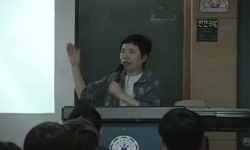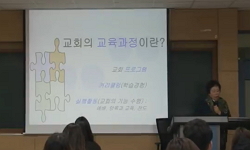The purpose of this article is to explore the Christian curriculum theory and to suggest a new perspective for Christian curriculum research that it might be called by "reconceptualists." The main streams of curriculum study in religious edu...
http://chineseinput.net/에서 pinyin(병음)방식으로 중국어를 변환할 수 있습니다.
변환된 중국어를 복사하여 사용하시면 됩니다.
- 中文 을 입력하시려면 zhongwen을 입력하시고 space를누르시면됩니다.
- 北京 을 입력하시려면 beijing을 입력하시고 space를 누르시면 됩니다.
부가정보
다국어 초록 (Multilingual Abstract)
More in details, this paper is composed of three small topics' First, it analyzes three main definitions of curriculum-subject-matter, experience, and transcendence- in related to three major approaches of curriculum theory(traditionalists, conceptual-empiricists, reconceptualists), and suggest that Christian curriculum can be understood on the basis of the reconceptualists, especially the process of transcendence of both the teacher and the learner. Secondly, this paper describes the characteristics of curriculum development models, and proposes to revise the current Christian curriculum development by the spiritual approach. Finally, it reflects critically on the curriculum implementation, in which curriculum and instruction could not be divided, and propose the curriculum praxis by the spiritual approach.
This paper, in conclusion, suggests that Christian curriculum theory should acknowledge the importance of the spirituality in close relation with the reconceptualists. Moreover, Christian curriculum theory needs to find its identity in spirituality for improving the curriculum theory and the creative Christian classroom.
The purpose of this article is to explore the Christian curriculum theory and to suggest a new perspective for Christian curriculum research that it might be called by "reconceptualists." The main streams of curriculum study in religious education field, in fact, have been focused on the "effectiveness" in terms of the conceptual-empiricists. Reflecting on such an aspect, however, It is difficult to find the identity of Christian curriculum study in comparsion with the general curriculum theory. The researcher, therefore, is trying to establish the spiritual approach for Christian curriculum theory, which is based on the new understanding on spirituality, i.e., wholeness, praxis, sacramentality, moreness, and cross of Jesus.
More in details, this paper is composed of three small topics' First, it analyzes three main definitions of curriculum-subject-matter, experience, and transcendence- in related to three major approaches of curriculum theory(traditionalists, conceptual-empiricists, reconceptualists), and suggest that Christian curriculum can be understood on the basis of the reconceptualists, especially the process of transcendence of both the teacher and the learner. Secondly, this paper describes the characteristics of curriculum development models, and proposes to revise the current Christian curriculum development by the spiritual approach. Finally, it reflects critically on the curriculum implementation, in which curriculum and instruction could not be divided, and propose the curriculum praxis by the spiritual approach.
This paper, in conclusion, suggests that Christian curriculum theory should acknowledge the importance of the spirituality in close relation with the reconceptualists. Moreover, Christian curriculum theory needs to find its identity in spirituality for improving the curriculum theory and the creative Christian classroom.
목차 (Table of Contents)
- Ⅰ. 서론
- Ⅱ. 교육과정 개념의 다양성과 교육과정 연구유형
- Ⅲ. 교육과정 개발의 영성
- Ⅳ. 교육과정 시행의 영성
- Ⅴ. 결론
- Ⅰ. 서론
- Ⅱ. 교육과정 개념의 다양성과 교육과정 연구유형
- Ⅲ. 교육과정 개발의 영성
- Ⅳ. 교육과정 시행의 영성
- Ⅴ. 결론
- 참고문헌
- Abstract
동일학술지(권/호) 다른 논문
-
- 한국기독교교육정보학회
- 김연종
- 2003
- KCI등재후보
-
효율적인 MK(Mission Kid)교육을 위한 가상교육 구현의 재고
- 한국기독교교육정보학회
- 성백
- 2003
- KCI등재후보
-
- 한국기독교교육정보학회
- 노영주
- 2003
- KCI등재후보
-
- 한국기독교교육정보학회
- 이숙종
- 2003
- KCI등재후보
분석정보
인용정보 인용지수 설명보기
학술지 이력
| 연월일 | 이력구분 | 이력상세 | 등재구분 |
|---|---|---|---|
| 2027 | 평가예정 | 재인증평가 신청대상 (재인증) | |
| 2021-01-01 | 평가 | 등재학술지 유지 (재인증) |  |
| 2018-01-01 | 평가 | 등재학술지 유지 (등재유지) |  |
| 2015-01-01 | 평가 | 등재학술지 유지 (등재유지) |  |
| 2011-01-01 | 평가 | 등재학술지 유지 (등재유지) |  |
| 2009-01-01 | 평가 | 등재학술지 유지 (등재유지) |  |
| 2006-01-01 | 평가 | 등재학술지 선정 (등재후보2차) |  |
| 2005-01-01 | 평가 | 등재후보 1차 PASS (등재후보1차) |  |
| 2003-01-01 | 평가 | 등재후보학술지 선정 (신규평가) |  |
학술지 인용정보
| 기준연도 | WOS-KCI 통합IF(2년) | KCIF(2년) | KCIF(3년) |
|---|---|---|---|
| 2016 | 0.54 | 0.54 | 0.5 |
| KCIF(4년) | KCIF(5년) | 중심성지수(3년) | 즉시성지수 |
| 0.58 | 0.59 | 0.655 | 0.14 |





 DBpia
DBpia







